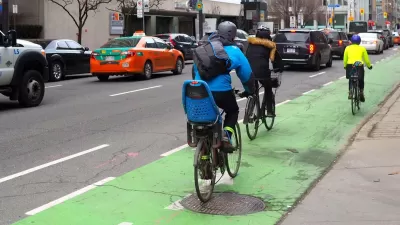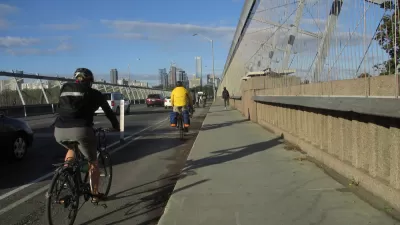Mick Sweetman of George Brown College criticizes Toronto city council's decision to remove an existing bike lane heavily used by that college's students.
The city council dominated by Toronto Mayor Rob Ford is often criticized for its regressive decisions where transportation planning is concerned, such as de-funding the "Transit City" plan. Now council has voted to remove a bike lane in order to "speed up" motor vehicle traffic, despite warnings that council will "have blood on its hands" as a result of inevitable cyclist deaths and injuries.
"[T]he estimated time that drivers will be saving by City Council's decision to eliminate the bike lanes on Jarvis Street is two minutes. A shorter wait than the average line at Tim Hortons [coffee shop] is what your city council thinks is more important than the safety of the 1,000 cyclists that ride on Jarvis Street every day. How many of those cyclists are riding to and from George Brown College's St. James campus, which sits only 150 meters from Jarvis St.? While the construction of separated bike lanes on Sherbourne Street -- which won't be ready until 2014 and so far are little more than glorified speed bumps -- are a good addition to the...poor cycling infrastructure in this city it makes no sense to be removing bike lanes from Jarvis.
I hate to say it, but city councilor Mike Layton is right when he said that cyclists are going to die on Jarvis because of this decision. When, not if, a cyclist is injured on Jarvis Street, their blood will be on [the] hands [of Mayor Rob Ford's supporters on Council]."
FULL STORY: Why ripping up bike lanes in Toronto will hurt students and cost lives

Alabama: Trump Terminates Settlements for Black Communities Harmed By Raw Sewage
Trump deemed the landmark civil rights agreement “illegal DEI and environmental justice policy.”

Planetizen Federal Action Tracker
A weekly monitor of how Trump’s orders and actions are impacting planners and planning in America.

Why Should We Subsidize Public Transportation?
Many public transit agencies face financial stress due to rising costs, declining fare revenue, and declining subsidies. Transit advocates must provide a strong business case for increasing public transit funding.

Understanding Road Diets
An explainer from Momentum highlights the advantages of reducing vehicle lanes in favor of more bike, transit, and pedestrian infrastructure.

New California Law Regulates Warehouse Pollution
A new law tightens building and emissions regulations for large distribution warehouses to mitigate air pollution and traffic in surrounding communities.

Phoenix Announces Opening Date for Light Rail Extension
The South Central extension will connect South Phoenix to downtown and other major hubs starting on June 7.
Urban Design for Planners 1: Software Tools
This six-course series explores essential urban design concepts using open source software and equips planners with the tools they need to participate fully in the urban design process.
Planning for Universal Design
Learn the tools for implementing Universal Design in planning regulations.
Caltrans
Smith Gee Studio
Institute for Housing and Urban Development Studies (IHS)
City of Grandview
Harvard GSD Executive Education
Toledo-Lucas County Plan Commissions
Salt Lake City
NYU Wagner Graduate School of Public Service




























